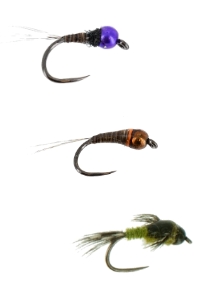Chironomid Flies & Midge Nymphs
Midges, midges, and more midge nymphs, they are everywhere! While there are plenty of effective nymph flies, the midge nymphs are probably the most predominant bug in every trout’s diet considering they hatch 365 days a year, including the winter and into the warm summer months. They exist in our lakes and most all rivers, however tail waters and spring creeks have a much bigger population than the rest.
Midges undergo 'complete metamorphosis', meaning that they pass through 4 complete life stages. These are the egg, larvae, pupa and adult stages. Adult female midges lay their eggs in aquatic habitats. They may scatter them over the surface of the water, or deposit them in a gelatinous mass on emergent vegetation. Midge nymphs or midge larva are the standard “nymph” form of a midge and are fished sub surface throughout the water column. At times trout will look for bigger meals when those bigger meals are more prevalent, but when you are not sure what to fish having midge nymphs on is always a good call. Often suspending midges under an indicator at certain depths, usually close to the bottom as they begin to emerge, can account for big numbers of fish. Try using a Crystal Chironomid or Jojo Chironomid on your next trip to a local trout lake. Another term for midges in this stage is chironomid flies, usually referred to the midges in most stillwater environments. A very prolific food source for trout because they can hatch at all times and chironomid flies are especially remarkable as many species show a wide range of tolerance to harsh environmental conditions.
Midge pupa are the emergent form of the midge patterns. The key difference between a midge larva/nymph and a midge pupa is the air bubble they use to emerge and the U-shape they often make while just below the water’s surface. Often, midge patterns with bead heads imitate a pupa because the flash of the bead imitates the air bubble. Chironomid flies can vary in size and come in many colors, predominantly have a red tone to them because they posse a large quantity of hemoglobin. Chironomid flies can vary in sizes from very small down to a size #8 at times. A term used a lot in stillwater fly fishing is called “midging” a very deadly technique which involves suspended these chironomid flies under an indicator to resemble them hatching off the lake bottom. The whole series of Beadhead Zebra Midge flies represent this stage very well.
Nymphs and midges are very abundant in all tailwaters and become a pattern that is often used for success. Fishing small midge larvae patterns and emergers can be the ticket when other bugs are not active. A few patterns like the WD40 and the RS2 along with your standard Zebra Midge can make anyone’s day throughout the year if drifted properly. It’s always a good idea to have a good line up of Midge nymphs in your fly box because sometimes the smallest bug can make the biggest difference in a day on the water. So at least make sure to check out our chironomid flies for sale on our website and grab a handful before your next trip!








